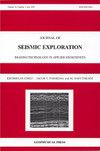Estimation of effective pressure and water saturation by viscoelastic inversion of synthetic time-lapse seismic data for a gas sandstone reservoir
IF 0.4
4区 地球科学
Q4 GEOCHEMISTRY & GEOPHYSICS
引用次数: 0
Abstract
Summary Inversion of synthetic seismic data for a viscoelastic reservoir model produces estimates of changes in effective pressure (Pe) and water saturation (Sw). Application is to analysis of time-lapse seismic data for a gas sandstone reservoir. To generate synthetic time-lapse viscoelastic seismic data, reservoir properties [porosity (�-), clay content, permeability (k), Pe and Sw] are used to define the corresponding viscoelastic seismic properties [compressional and shear velocities (Vp and Vs), density (�! ) and compressional and shear quality factors (Qp and Qs)] using petro-seismic modeling. It is assumed that porosity, clay content and permeability do not change during production and are known. Full wavefield inversion is performed for different production scenarios, on synthetic viscoelastic time-lapse seismic data, using a grid search refined by a conjugate gradient solution. Estimation of unique values of Pe and Sw from two independent data (such as Vp/Vs and Qs/Qp) is feasible, if the other reservoir properties are known. Noisy data produces a range of solution values. The composite effect of ®Pe and ®Sw is approximately equal to the sum of the two separate effects. Seismic time-lapse changes are less sensitive to the pressure change than to changes in saturation. For the reservoir properties (�- , clay content, k), and the dominant seismic frequency used in the example, �! and Qs/Qp are most sensitive to Sw, Vp is most sensitive to Pe, and Vs, Qp and Qs and Vp/Vs are sensitive to both Sw and Pe.含气砂岩储层时移合成地震资料粘弹性反演有效压力和含水饱和度
对粘弹性储层模型的合成地震数据进行反演,可以估算出有效压力(Pe)和含水饱和度(Sw)的变化。应用于某含气砂岩储层时移地震资料分析。为了生成合成时移粘弹性地震数据,利用储层性质[孔隙度(-)、粘土含量、渗透率(k)、Pe和Sw]来定义相应的粘弹性地震性质[纵波和剪切速度(Vp和Vs)、密度(- !)]。以及挤压和剪切质量因子(Qp和Qs)]。假设孔隙度、粘土含量和渗透率在生产过程中不变,并且是已知的。利用共轭梯度解改进的网格搜索,对合成粘弹性时移地震数据进行了不同生产场景下的全波场反演。如果已知其他储层性质,则可以通过两个独立数据(如Vp/Vs和Qs/Qp)估算出Pe和Sw的唯一值。有噪声的数据产生一系列的解值。®Pe和®Sw的复合效应近似等于两种单独效应的总和。地震时移变化对压力变化的敏感性低于对饱和度变化的敏感性。对于储层性质(-,粘土含量,k),以及示例中使用的主要地震频率,- !Qs/Qp对Sw最敏感,Vp对Pe最敏感,Vs、Qp、Qs和Vp/Vs对Sw和Pe都敏感。
本文章由计算机程序翻译,如有差异,请以英文原文为准。
求助全文
约1分钟内获得全文
求助全文
来源期刊

Journal of Seismic Exploration
地学-地球化学与地球物理
CiteScore
0.70
自引率
0.00%
发文量
0
审稿时长
4.5 months
期刊介绍:
The Journal of Seismic Exploration is an international medium for the publication of research in seismic modeling, processing, inversion, interpretation, field techniques, borehole techniques, tomography, instrumentation and software.
 求助内容:
求助内容: 应助结果提醒方式:
应助结果提醒方式:


